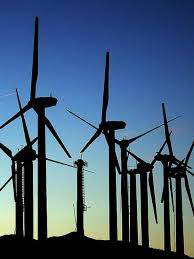Chinese Wind Farm in Texas: 'It's the greatest national security concern'

A windmill project near Laughlin Air Force Base in Del Rio has many concerned because the owner is a Chinese company. Fox San Antonio investigates why some fear that company could tap into the U.S. Government.
Its 130,000 acres, the size of Tulsa, Oklahoma, bought legally for wind energy.. so what's wrong with that? Well, according to the congressman whose district includes Laughlin Air Force Base in Del Rio, the question is: should a company that has connections to the ruling Communist Party in China, have the ability to connect to our grid and be so close to the air force base that trains so many?
Laughlin Air Force Base... since the 1950's, more than 21,000 silver wings have been pinned on pilots trained here. American and allied nations invited to learn to fly, but now an uninvited neighbor has bought land by the base that has many worried about the security of the U.S. power grid and the security of United States secrets.
“The question about, should a company that has connections to the ruling Communist Party in China have the ability to connect to our grid?" said Congressman Will Hurd.
Congressman Will Hurd and Senator Ted Cruz have raised questions about Houston-based GH America Energy, which is a wholly owned subsidiary of Chinese Guanghua industry investment group. Its CEO, a former Sun Guangzin, a member of the Communist Party and a former member of the Chinese military, now wants to build wind turbines on the more than 130,000 acres that he has purchased since 2015 by Devils river.
“These are the broader questions. A retired general or admiral from the U.S. military would not be able to buy property outside of Beijing and put up a wind farm and connect to the Chinese grid. So for me, this is a broader question about reciprocity," said Hurd.
In layman's terms when Texas deregulated our energy market, Texas being one of 3 power grids in the U.S., we left ourselves open according to Congressman Hurd for other countries including adversaries like China to tap in to our source of energy.
“And what’s scary about that is, if you become a provider, all the updates about a tax to our grid, that CPS energy gets, in order to defend, that could potential be going to an adversary as well," said Hurd.
This would never be allowed to happen in China according to Hurd, who is a retired CIA agent.
“There’s a national security law that says Chinese companies have to work with the Chinese government when it comes to national security issues. This is not like in the U.S. where a Department of Justice has to have a judge to decide if this information is valuable," said Hurd.
If the Chinese government says we want this, they have to get it. If a U.S. company or investor can’t do it in China, a Chinese company or investor shouldn’t be able to do it here,” said Hurd.
In March of this year during a visit to Laughlin Air Force Base, Senator Ted Cruz in an interview with the newspaper in Del Rio said “China is, without question, America’s most significant long-term geopolitical rival. China has demonstrated a willingness to invest billions of dollars expanding its surveillance state, its offensive military capability and its economic muscle, and in the senate, I have worked hard to focus our national security and foreign policy efforts on constraining the hostile intentions of China.”
That was just a few months before the Chinese consulate in Houston was shut down for possible espionage.
“This consulate in Houston was involved in a scheme and in order to get the universities around the United States, in order to apply for things so they can learn about their research. We know that the Chinese were trying to steal information on the response to Covid and on the test for Covid. When you look at San Antonio, we have an NSA facility, a cyber command here, a number of universities that work with the federal government on intelligence matters. Right now this Chinese wind farm is going through a national security review process that has the FBI involved and the department of energy involved,” said Hurd.
We contacted GH America Energy for a statement and they have not responded back to us.
Photo and Link: https://foxsanantonio.com/news/yami-investigates/chinese-wind-farm-in-texas-its-the-greatest-national-security-concern-said-hurd











